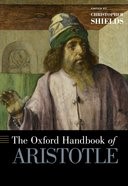This bibliography supplements the individual chapter bibliographies by recommending: (i) in the first instance online bibliographies; (ii) then also standard editions of Aristotle’s works in English translation; (iii) translations and commentaries intended for further philosophical study, published in the Clarendon Aristotle Series; (iv) general omnibus books for those seeking to familiarize themselves with the main outlines of Aristotle’s thought; (v) anthologies and guidebooks directed primarily to students; and (vi) online resources, drawn from articles in the Stanford Encyclopedia of Philosophy, many of which feature further bibliographies relevant to their individual topics.
(i) Online Bibliographies
Although they remain valuable, print bibliographies suffer from being out of date more or less from the moment they appear. Dynamic online bibliographies have the advantage of admitting augmentation as new works appear. Four on-line bibliographies will prove worth consulting, both now and especially as the publication date of this volume recedes into the past.
The first is the bibliography to Shields, ‘Aristotle,’ in the Stanford Encyclopedia of Philosophy:
This entry divides Aristotle’s works into sections comparable to those employed in the present volume, and emphasizes especially influential publications and other works which advance the study of Aristotle in significant ways. It is updated at regular intervals.
The second recommended online bibliography, unlike the first, is not open-access and so can be accessed only by subscription, whether individual or institutional. It is, however, many times more comprehensive. Compiled by Dr. Richard Ingardia, the bibliography is published by Brill Publishers. The site is accessible under:
Dr. Ingardia’s bibliography, covering over 100 years of scholarship in all major European languages, now runs to over 50, 000 entries and will continue to be updated twice per year. It is fully searchable and allows users to export and print its entries.
A third online bibliography is offered under the auspices of Oxford University Press in the Oxford Online Bibliographies series. The Aristotle bibliography, assembled by Prof. Christof Rapp, is limited in scope, because it aims to provide a guided introduction to the most significant works on Aristotle. Although the works cited are not all elementary, they have been selected with an eye on guiding students to further study. The site is accessible under:
This work is available by subscription only.
An open-access bibliography,
Philosophiae ianua bibliographica, created by Joachim Aul, which includes a full complement of works on Aristotle, not restricted to English, is available in the online German magazine,
Information Philosophie:
The extensive Aristotle bibliography available here can be accessed through the general bibliographical section, where philosophers and philosophical topics are arranged alphabetically (beginning on the homepage, under
Informationen and then
Bibliographie).
(ii) Translations:
Aristotle’s collected works were translated into English by a team of translators between 1912 and 1954, and made available in twelve volumes under the title
The Oxford Translation of Aristotle. This work was superseded in 1984 by a revised and augmented version edited by Jonathan Barnes, available in two volumes:
• J.
Barnes, ed. (
1984)
The Complete Works of Aristotle: the Revised Oxford Translation,
vols. 1 and 2 (Princeton: Princeton Univ. Press).
Close
This same work is also available in a searchable format online, by subscription:
The electronic version permits simple and sophisticated searches of the entire Aristotelian corpus in translation.
Although not comprehensive, a full and judiciously selected presentation of Aristotle’s works in English translation is provided in:
• Fine,
G., and T. Irwin (
1995)
Aristotle: Selections
(Indianapolis: Hackett Pubs.).
Close
Despite its offering only selections, this work affords some advantages over the still invaluable
Revised Oxford Translation. Although expertly revised by Barnes, the
Revised Oxford Translation remains the work of many different hands, drawn from across the twentieth century, deploying uncoordinated diction and reflecting different translational idioms. In addition to its uniform diction,
Aristotle: Selections offers a succinct and instructive glossary of topics and terms, an especially useful study aid to those not already familiar with Aristotle’s thought.
(v) General Guide Books to Aristotle
Among the proliferation of handbooks, guides, and companions dedicated to the study of Ancient Philosophy, one finds many dozens of chapters devoted to Aristotle’s works. Two general guide books dedicated to Aristotle alone are:
• Anagnostopoulos,
G. (
2009)
A Companion to Aristotle
(Malden, MA: Wiley-Blackwell).
Close
• Barnes,
J. (
1995)
The Cambridge Companion to Aristotle
(Cambridge: Cambridge Univ. Press).
Close
Barnes’s volume includes an excellent extensive bibliography presented in a discursive fashion, which has been partially derived from an earlier, excellent collection of papers on Aristotle:
•
Barnes, J., M. Schofield, and R. Sorabji, eds., Articles on Aristotle vols 1–4:
•
Vol. 1. (1975) Science (London: Duckworth).
•
Vol. 2. (1977) Ethics and Politics (London: Duckworth).
•
Vol. 3. (1979) Metaphysics (London: Duckworth).
•
Vol. 4. (1979) Psychology and Aesthetics (London: Duckworth).
These volumes feature many articles which have proven seminal in the study of Aristotle.
 The Oxford Handbook of Aristotle
The Oxford Handbook of Aristotle